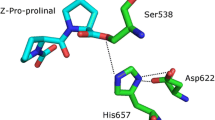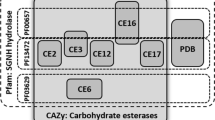Abstract
The acylpeptide hydrolase of porcine intestinal mucosa (pi-APH) is a serine peptidase belonging to the prolyl oligopeptiase family. The enzyme catalyzes the release of N-terminal acylamino acids, especially acetylamino acids, from acetylpeptides. pi-APH is an homotetramer of approximately 300 kDa. We report the loss of the native tetrameric structure of pi-APH upon citraconylation and the process was reversed at acidic pH, indicating that the subunits were noncovalently bound. Determination of free cysteines in combination with peptide mapping suggested the involvement of all cysteines in disulfide bridges. Two structural domains were identified based on the three-dimensional model of pi-APH monomer: a β-propeller fold in the N-terminal sequence (113–455) and an α/β hydrolase fold corresponding to the C-terminal catalytic domain (469–732). Preferential cleavage sites for limited proteolysis with trypsin occurred within the β-propeller domain, in agreement with the three-dimensional model. The putative role of this domain in the specificity mechanism of APH enzymes is also discussed.
Similar content being viewed by others
REFERENCES
Abbott, C. A., McCaughan, G. W., Levy, M. T., Church, W. B., and Gorrell, M. D. (1999). Eur. J. Biochem. 266: 798–810.
Aitken, A., and Learmonth, M. (1996). In The Protein Protocols Handbook (Walker, J. M., ed) pp. 487–488.
Barrett, A. J., and Rawlings, N. D. (1992). Biol. Chem. Hoppe-Seyler 373: 353–360.
Batra, P. P. (1991). Biochimie 73: 1397–1402.
Bidlingmeyer, B. A., Cohen, S. A., and Tarvin, T. L. (1984). J. Chromatogr. 336: 93–104.
Bradford, M. M. (1976). Anal. Biochem. 72: 248–254.
Brandt, W. (2000). Adv. Exp. Med. Biol. 477: 97–101.
Brown, J. L., and Roberts, W. K. (1976). J. Biol. Chem. 251: 1009–1014.
Chongcharoen, K., and Sharma, K. K. (1998). Biochem. Biophys. Res. Commun. 247: 136–141.
Dodson, G., and Wlodawer, A. (1998). Trends Biochem. Sci. 23: 347–352.
Driessen, H. P., de Jong, W. W., Tesser, G. I., and Bloemendal, H. (1985). CRC Crit. Rev. Biochem. 18: 281–325.
Feese, M., Scaloni, A., Jones, W. M., Manning, J. M., and Remington, S. J. (1993). J. Mol. Biol. 233: 546–549.
Fülöp, V., Böcskei, Z., and Polgar, L. (1998). Cell 94: 161–170.
Fülöp, V., and Jones, D. T. (1999). Curr. Opin. Struct. Biol. 9: 715–721.
Fülöp, V., Szeltner, Z., and Polgar, L. (1999). EMBO Rep. 1: 277–281.
Gabriel, O. (1971). Methods Enzymol. 22: 565–604.
Gade, W., and Brown, J. L. (1981). Biochim. Biophys. Acta 662: 86–93.
Goossens, F., De Meester, I., Vanhoof, G., Hendriks, D., Vriend, G., and Scharpe, S. (1995). Eur. J. Biochem. 233: 432–441.
Guex, N., and Peitsch, M. C. (1997). Electrophoresis 18: 2714–2723.
Heikinheimo, P., Goldman, A., Jeffries, C., and Ollis, D. L. (1999). Structure 7: R141–R146.
Hershko, A., Heller, H., Eytan, E., Kaklij, G., and Rose, I. A. (1984). Proc. Natl. Acad. Sci. USA 81: 7021–7025.
Hewick, R. M., Hunkapiller, M. W., Hood, L. E., and Dreyer, W. J. (1981). J. Biol. Chem. 256: 7990–7997.
Jörnvall, H. (1975). J. Theor. Biol. 55: 1–12.
Kobayashi, K., and Smith, J. A. (1987). J. Biol. Chem. 262: 11435–11445.
Laemmli, U. K. (1970). Nature 227: 680–685.
Mitta, M., Miyagi, M., Kato, I., and Tsunasawa, S. (1998). J. Biochem. 123: 924–931.
Miyagi, M., Sakiyama, F., Kato, I., and Tsunasawa, S. (1995). J. Biochem. 118: 771–779.
Ollis, D. L., Cheah, E., Cygler, M., Dijkstra, B., Frolow, F., Franken, S. M. (1992). Protein Eng. 5: 197–211.
Paoli, M. (2001). Prog. Biophys. Mol. Biol. 76: 103–130.
Peitsch, M. C. (1996). Biochem. Soc. Trans. 24: 274–279.
Raphel, V., Giardina, T., Guevel, L., Perrier, J., Dupuis, L., Guo, X. J. (1999). Biochim. Biophys. Acta 1432: 371–381.
Raphel, V., Lupi, N., Dupuis, L., and Puigserver, A. (1993). Biochimie 75: 891–897.
Rawlings, N. D., Polgar, L., and Barrett, A. J. (1991). Biochem. J. 279: 907–908.
Richards, P. G., Johnson, M. K., and Ray, D. E. (2000). Mol. Pharmacol. 58: 577–583.
Scaloni, A., Barra, D., Jones, W. M., and Manning, J. M. (1994). J. Biol. Chem. 269: 15076–15084.
Scaloni, A., Ingallinella, P., Andolfo, A., Jones, W., Marino, G., and Manning, J. M. (1999). J. Protein Chem. 18: 349–360.
Scaloni, A., Jones, W. M., Barra, D., Pospischil, M., Sassa, S., Popowicz, A. (1992). J. Biol. Chem. 267: 3811–3818.
Senthilkumar, R., Reddy, P. N., and Sharma, K. K. (2001). Exp. Eye Res. 72: 301–310.
Sharma, K. K., and Ortwerth, B. J. (1993). Eur. J. Biochem. 216: 631–637.
Smialowski-Fleter, S., Moulin, A., Villard, C., and Puigserver, A. (2000). Eur. J. Biochem. 267: 2227–2234.
Smyth, D. G., Massey, D. E., Zakarian, S., and Finnie, M. D. (1979). Nature 279: 252–254.
Stone, K. L., and Williams, K. R. (1996). In: J.M., W. (ed.), The Protein Protocols Handbook, pp. 415–425.
Tsunasawa, S., Narita, K., and Ogata, K. (1975). J. Biochem. 77: 89–102.
Tsunasawa, S., and Sakiyama, F. (1984). Methods Enzymol. 106: 165–170.
Author information
Authors and Affiliations
Rights and permissions
About this article
Cite this article
Durand, A., Villard, C., Giardina, T. et al. Structural Properties of Porcine Intestine Acylpeptide Hydrolase. J Protein Chem 22, 183–191 (2003). https://doi.org/10.1023/A:1023431215558
Published:
Issue Date:
DOI: https://doi.org/10.1023/A:1023431215558




